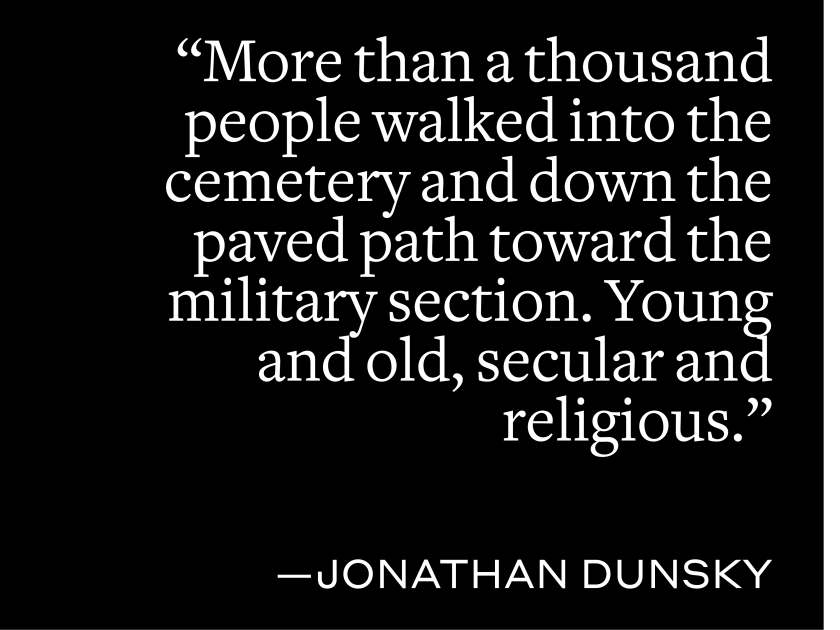
This piece is one of an ongoing series that we will be sharing in the coming days from Israeli authors and authors in Israel.
It is critical to understand history not just through the books that will be written later, but also through the first-hand testimonies and real-time accounting of events as they occur. At Jewish Book Council, we understand the value of these written testimonials and of sharing these individual experiences. It’s more important now than ever to give space to these voices and narratives.
In collaboration with the Jewish Book Council, JBI is recording writers’ first-hand accounts, as shared with and published by JBC, to increase the accessibility of these accounts for individuals who are blind, have low vision or are print disabled.
I got the word a little after seven last night (October 10, 2023). There was going to be a military funeral where I live, Zichron Yaakov, at eight o’clock in the evening.
The decision made itself; I was going. This despite the fact that I did not know the fallen soldier, Major Roi Chapel, twenty-five years old, of the Nahal Brigade. Nor did I know his family.
But I felt compelled to pay my last respects to a son of my community who fell in battle to defend Israel.
I decided to walk to the funeral. I usually walk whenever the weather is mild, as it was last night. The walk took about twenty minutes and somewhere around the midpoint, I started wondering whether I should have taken the car. What if there’s a siren? What if rockets start falling out of the sky? It would take me precious minutes to get back home and into the safe room. I might not make it back at all.
By the time I arrived at the cemetery, a large crowd had gathered by the main gate. Some of them were in uniform and others wore t‑shirts bearing Major Chapel’s unit’s name and number. Israeli combat soldiers often get such shirts at the end of basic training or an arduous course.
A few of the soldiers had bandages on their arms. One supported himself on crutches. I caught snatches of their conversations and learned that these were fresh injuries. They had happened in this current war.
More than a thousand people walked into the cemetery and down the paved path toward the military section. Young and old, secular and religious. We were a cross section of Jewish society.
I stood well back from the military section. Those who knew Major Chapel, and no doubt felt his loss more keenly, congregated to the front of the gravesite. An honorary guard of soldiers bearing the bright green caps of the Nahal Brigade stood by the grave. With them were officers, a military rabbi, and Major Chapel’s family and close friends.
Before the funeral started, the master of ceremony delivered this warning over the sound system: in case of a siren, lie flat on the ground for ten minutes and cover your head with your arms. I scoped the area immediately around me, searching for the most secure patch of hallowed ground on which to lie. There were two tall headstones three or four feet behind me. In case of a rocket attack, I decided, I would stretch myself between them. They would offer me a measure of protection.
These are the sort of things you think about in Israel these days.
The ceremony began. Major Chapel’s father said the Kaddish over his grave. And when it ended, he added that he hoped he would be the last father to say the Kaddish over his son. But no one in the crowd believed his wish could stand for long. So far, 171 soldiers have died in this war, as well as several dozen police officers and members of other security bodies. What the final, awful tally will be at the end of this war, no one can say.
After the Kaddish came the eulogies. We heard from Major Chapel’s mother, his sister, his girlfriend, his commander, and his friends, from the army and from before it. The picture they painted was of a natural leader – a wonderful commander and a young man full of motivation and love for his country.
You don’t get to be a major in the Israeli infantry any other way.
A recently discharged soldier who had served with Major Chapel said he was sorry he hadn’t been at his side during the battle that claimed his life. Survivor’s guilt, I thought. An added pain to that of grief.
At some point, I found myself with tears in my eyes. I don’t remember exactly when. I thought of this wonderful man who held such promise, who had brought love and joy and light into the life of so many people, and who had made the ultimate sacrifice so that Jews could live freely and securely on their land.
In one of the eulogies, someone said, “Roi went to battle and did not return. But because of his actions, many others did.”
Perhaps that knowledge brings some comfort to his family. I hope that it does.
Rest in peace, Major Chapel, and may your family know no more sorrow.
The views and opinions expressed above are those of the author, based on their observations and experiences.
Support the work of Jewish Book Council and become a member today.
Jonathan Dunsky is the author of the Adam Lapid historical mysteries series and the standalone thriller The Payback Girl. Before turning to writing, Jonathan served for four years in the Israeli Defense Forces and worked in the high-tech and Internet industries. He resides in Israel with his wife and two sons.